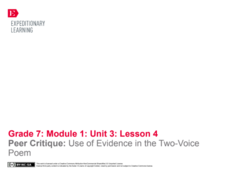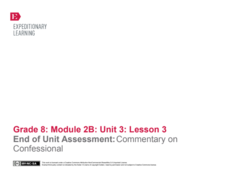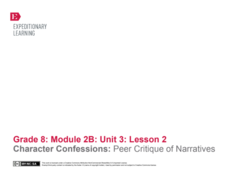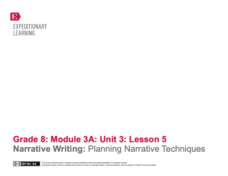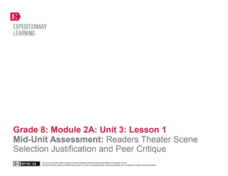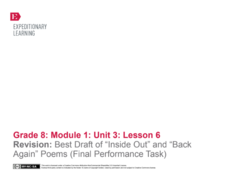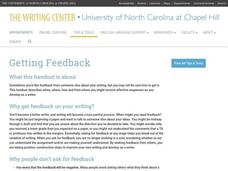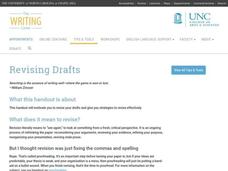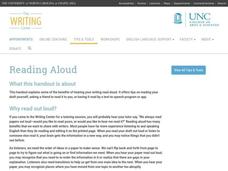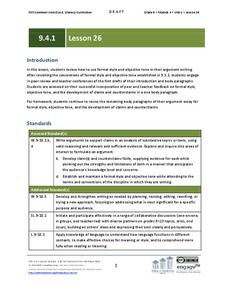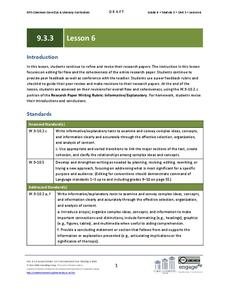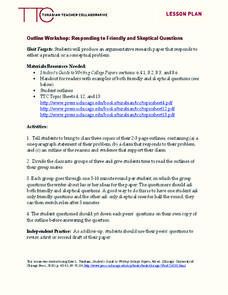EngageNY
Peer Critique: Use of Evidence in the Two-Voice Poem
Peer editors review critique expectations before offering feedback on each other's two-voice poems. They record their feedback on peer critique recording forms, and then begin revising their poems.
EngageNY
Preparation for Performance Task: Practicing Presentations
Practice makes progress. Working in pairs, presenters rehearse and refine their presentation skills before the big day when they pitch their film choices. Rehearsing also allows for refining prompt cards based on peer feedback and...
EngageNY
End of Unit Assessment: Commentary on Confessional
What does commentary have to do with narrative? Before scholars explain the narrative choices in their Character Confessionals, they review provided commentary to explain the score they received on previous assessments. They review...
EngageNY
Character Confessions: Peer Critique of Narratives
Shake up the writing process with a peer critique. The second of four lessons in the Grade 8 ELA Module 2B, Unit 3 series first has young writers compare their interpretations of a scene from William Shakespeare's A Midsummer Night's...
EngageNY
Narrative Writing: Planning Narrative Techniques
It's all in the technique. Scholars revisit the model narrative they covered in lesson four to analyze the author's writing techniques. Readers compare techniques they spot in the narrative to those in the essay rubric. They then work to...
EngageNY
End of Unit 3 Assessment: Readers Theater Commentary
Prove it! In the end-of-unit assessment, scholars write a commentary and provide evidence to justify the connection between their reader's theater scripts and To Kill A Mockingbird. After completing the assessment, they practice...
EngageNY
Mid-Unit Assessment: Readers Theater Scene Selection Justification and Peer Critique
Is it justified? Readers complete the mid-unit assessment to justify their reader's theater scenes and quote choices from To Kill A Mockingbird. After completing the assessment, scholars conduct peer reviews and critique the script...
EngageNY
Writing an Argument Essay: Planning the Essay
It's time for a quote sandwich! Using the resource, pupils learn about the three parts of an effective quotation: introduction, quote, and analysis. Scholars use the model to peer critique each others' writing to show what they learned.
EngageNY
Peer Critique of “Inside Out” and “Back Again” Poems
Class members closely examine the use of words in the poems "Inside Out" and "Back Again" to determine if different words would create more powerful poetry. They then conduct peer reviews of the poems they created and offer suggestions...
EngageNY
Revision: Best Draft of “Inside Out” and “Back Again” Poems (Final Performance Task)
Scholars read their poems to their research teams as their final performance task. The teams listen and give feedback on the flow between the two poems. Writers then take the feedback from their teams and revise their poems before...
EngageNY
Writing and Argument Essay: Peer Critique with Rubric (Chapters 29-31, Including Synthesis of Scenes in Previous Chapters)
Hungry? Try a quote sandwich! Writers discover the concept of using a quote sandwich to introduce and analyze a quote in an argumentative essay properly. Additionally, pupils engage in peer critiques, analyzing each other's drafts and...
University of North Carolina
Editing and Proofreading
Writing is not a one and done process. In fact, the stages of editing and proofreading, the focus of a flyer from a larger set of writing skills handouts, play a major role in creating a strong paper. However, as the reference sheet...
University of North Carolina
Getting Feedback
As many writers know, you are your own worst editor. The 10th installment in the Writing the Paper series explains that getting feedback from others is crucial to the writing process. The handout highlights the best time to ask others to...
University of North Carolina
Revising Drafts
Don't simply proofread ... revise instead! Revising drafts is the topic of the 17th handout in UNC's Writing the Paper series of 24 lessons. Writers discover the importance of revision, as well as steps to follow during the process.
University of North Carolina
Reading Aloud
Warning: reading your paper aloud may cause bystanders to think you're talking to yourself. However, as the 14th installment of 24 in the Writing the Paper series from UNC explains, it is one of the best strategies for revision. Through...
NASA
Revising an Investigation
Write, edit, and then revise! The fourth lesson in a five-part series asks peers to provide feedback on research. Individuals then use the research to edit and revise conclusions and develop their presentations.
EngageNY
Grade 9 ELA Module 4, Unit 1, Lesson 26
The focus of the day's instructional activity is methods for creating a formal style and objective tone in an argument essay. After examining models, pairs engage in peer review of their essay drafts and continue to revise while...
EngageNY
Grade 9 ELA Module 3, Unit 3, Lesson 8
Writers complete editing and polishing the final draft of their research paper and submit the document for assessment.
EngageNY
Grade 9 ELA Module 3, Unit 3, Lesson 7
As the unit on research writing draws to a close, class members continue to revise and edit their papers, this time focusing on grammar, spelling, and punctuation (colon and semicolon).
EngageNY
Grade 9 ELA Module 3, Unit 3, Lesson 6
The eighth lesson in the editing process focuses on flow and cohesiveness in the entire research paper. Class members examine color-coded pre- and post-revision model paragraphs and then work in pairs to revise and peer-review their papers.
Turabian Teacher Collaborative
Outline Workshop: Responding to Friendly and Skeptical Questions
Answering questions is the best way to hone and revise your argument. Foster receptive writers with a workshop activity that promotes peer editing and argumentative writing skills. Given lists of both friendly and skeptical questions,...
EngageNY
End of Unit 2 Assessment: Final Draft of Literary Argument Essay
Take the last step in writing a literary argument essay using Bud, Not Buddy by Christopher Paul Curtis in an activity focused on feedback. Using the stars and steps revision method, pupils consider teacher and peer feedback to revise...
EngageNY
Peer Critique for Organization and Style
Put another set of eyes on your class's historical fiction narratives with one of the final lessons in the unit. Fourth graders use feedback from their peers to annotate their drafts for revision, particularly their bold beginnings and...
EngageNY
Reviewing Conventions and Editing Peers’ Work
Encourage young writers to edit text based on conventions. After reviewing the conventions, fourth graders watch a teacher demonstrate how to revise a paragraph for correct spelling, capitalization, punctuation, or dialogue. Then, pairs...


